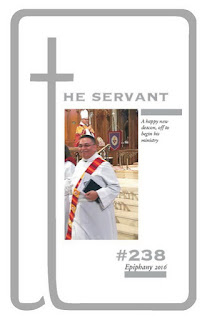December 30, 2015
December 24, 2015
The True Cost of Christmas
December 13, 2015
Verse for Advent III
Happiness is made of spun sugar
and dissolves in the presence of tears.
But Joy is a rock and foundation
that withstands all the waves
of our sorrows and fears.
TSH
with thanks to Ken Ironside for his sermon and inspiration
December 11, 2015
Thought for December 11
Socialism, when it doesn't work, is hardly worse than capitalism when it does.
What do I mean by that? Simply that the ideal of socialism (as a system which asks "from each according to ability," and hopes to provide "to each according to need") is a rather noble goal, one which like many a noble goal runs aground on human greed and selfishness, in particular in the tendency of supposedly equitable societies to produce oligarchy rather than equity. This is a flaw and a failure in the socialist programme, but it may be unavoidable.
However, the ideal of capitalism is to some extent the same programme adopted and engaged, driven by those very forces of greed, selfishness, and oligarchy, neatly wrapped up in the "profit motive" that drives the whole system. As with the excuse for faulty software: "It's not a bug, it's a feature," the "bug" that wrecks many socialist endeavors is the main feature of capitalism: profit. Which is why few truly "free markets" are allowed to operate with total freedom, as it doesn't take an economist to see the abuses that result when profit runs roughshod over safety both personal and societal. Some regulation is needed as a curb on profit for profit alone.
It is in large part because I am a realist rather than an idealist that I acknowledge the faults of both (and all other) economic enterprises. They all run into human nature, amplifying at times the worst in us all. But the hope of social economic justice speaks to me as a Christian, and even if it is a fond hope, it is one I will seek to realize in this imperfect and imperfectable world.
Tobias Stanislas Haller BSG









